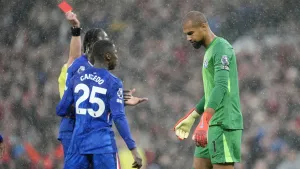Chelsea goalkeeper Robert Sánchez has been a polarizing figure since joining the club, often seen as a stopgap solution amid occasional high-profile errors. However, under manager Enzo Maresca, Sánchez has shown signs of improvement, particularly during Chelsea's strong Club World Cup campaign.
Despite early considerations to replace him with Filip Jörgensen—who faltered in his own opportunities—Maresca has stuck with Sánchez, even amid transfer rumours linking the Blues to top keepers like Mike Maignan and Gianluigi Donnarumma.
That loyalty was tested in Chelsea's recent 2-1 defeat at Old Trafford against Manchester United, where Sánchez was sent off early for a reckless challenge on Brentford's Bryan Mbeumo (note: the incident appears to involve a mismatch in team references, but the focus remains on the red card event).
The dismissal came after Sánchez denied a clear goal scoring opportunity, rushing out of his box and fouling the forward in a high challenge. While the tackle drew criticism for its intensity, the key detail lies in the nature of the offense—and why it won't side-line Sánchez from Premier League action.
Understanding the Red Card and Suspension Rules
Sports Illustrated have confirmed, the type of red card offense directly impacts the length of a player's suspension in the Premier League. If a player is dismissed for violent conduct—such as a dangerous or aggressive act intended to harm an opponent—they typically face a minimum three-match ban. This rule is designed to deter reckless behaviour that endangers player safety.
However, Sánchez's red card was classified as denying an obvious goal scoring opportunity (often abbreviated as DOGSO), rather than violent conduct. Under FA and Premier League regulations, a DOGSO red card results in just a one-match suspension. This shorter ban reflects the tactical nature of the foul, where the primary intent is to prevent a goal rather than inflict injury, even if the challenge appears harsh.
The distinction is critical here. While Maresca expressed frustration over the "costly" error that left Chelsea a man down for most of the match, the ruling means Sánchez's punishment is limited.
How the Ban Plays Out for Chelsea
Sánchez's one-game ban will be served in Chelsea's upcoming Carabao Cup third-round fixture against Lincoln City—a midweek match where he was unlikely to feature anyway. Filip Jörgensen is expected to step in as the starter for that game, aligning with Maresca's rotation strategy in cup competitions.
As a result, Sánchez will be fully available for Chelsea's next Premier League encounter against Brighton & Hove Albion. This scheduling quirk ensures that the red card's consequences are confined to a lower-priority cup tie, sparing Sánchez from missing any top-flight action. Maresca is likely to reinstate him in the league lineup, given his recent form and the manager's ongoing support.
Implications for Chelsea's Season
This outcome is a relief for Chelsea, who are navigating a competitive Premier League campaign. Losing Sánchez for multiple league games could have disrupted their momentum, especially with defensive vulnerabilities already under scrutiny. Instead, the team can focus on bouncing back without major personnel changes in goal.
While Sánchez's decision-making in the incident has sparked debate among fans and pundits, the rules are clear: no violent conduct means no extended ban. As Chelsea pushes for silverware on multiple fronts, this minor setback in the cup could even provide a motivational boost for the Spanish shot-stopper in upcoming Premier League fixtures.


